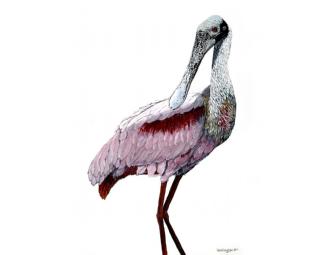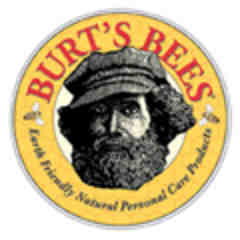Art & Photos
"Roseate Spoonbill" Print
- Item Number
- 290
- Estimated Value
- 50 USD
- Sold
- 40 USD to barker
- Number of Bids
- 6 - Bid History
Item Description
Roseate Spoonbill
Artist: Nathalie Worthington
Limited edition (488/500) signed print
Print measures approximately 20" x 25".
From the artist: "The Roseate Spoonbill is found only in the Western Hemisphere: Florida, Texas and Louisiana; Central and South America. All spoonbills have long spatulate or spoon-shaped bills, but the Roseate is the only one mistaken for another long-legged wader, the flamingo because of its distinctive plumage. Locally called "pinks" or "pink curlews", the mature birds - both male and female - also have red streaks from wing to back, a bald greenish head, and a bright orange tail. A spoonbill's main foraging strategy is an instinctive sense of touch. As it wades through murky pools or shallows, it swings its partly-open bill from side to side through the water. Sense receptors on the bill's underside signal contact with small fish, insects or crustaceans. The bill instantly closes and lifts for swallowing. Mating when three years old, the Roseates need secluded island hideouts for their connubial activites. The male collects sticks and the female builds a deep, well-constructed nest in association with heron and ibis colonies or rookeries in mangroves, salt marshes, and freshwater estuaries. Both parents take turns brooding, keeping, vigil, finding food, and feeding their young. Prior to 1900, hundreds of thousands of Roseate, Soonbills called the U.S. home, but by the 1920's there were a few hundred; their meat was eaten, and their exotic plumage appeared on ladies' hats and feather fans. Extinction north of the Rio Grande seemed imminent. Thanks to sanctuary efforts by the National Audubon Society, and its continued collaborative efforts with Fish and Wildlife, and Park Services, as well as efforts to reduce pollution, the truce between man and bird is today being precariously maintained."
NC Conservation Network stores data...
Your support matters, so NC Conservation Network would like to use your information to keep in touch about things that may matter to you. If you choose to hear from NC Conservation Network, we may contact you in the future about our ongoing efforts.
Your privacy is important to us, so NC Conservation Network will keep your personal data secure and NC Conservation Network will not use it for marketing communications which you have not agreed to receive. At any time, you may withdraw consent by emailing Privacy@frontstream.com or by contacting our Privacy Officer. Please see our Privacy Policy found here PrivacyPolicy.










